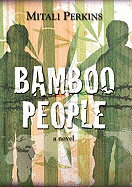
Most young people probably don't even know where to find Myanmar (formerly known as the Union of Burma), and if they do, it's because it made headlines when Cyclone Nargis hit its coast in 2008. But Perkins's (Secret Keeper) involving novel about two teens on either side of the conflict at the Burma-Thai border exposes readers to this little-known part of the world and the issues at the heart of the country's great divide. The book begins with 15-year-old Chico reading A Tale of Two Cities in the walled garden outside the home he shares with his mother. She tells him to come inside; a Burmese boy reading English is enough to rouse suspicion with the soldiers who accused Chico's physician father of treason and hauled him away to prison. Determined to help support his mother, Chico answers an ad in the government newspaper about an exam for new teachers--then discovers it's a trap. The army conscripts all the young men who come to apply for jobs. Instead of becoming a teacher, Chico learns some life-saving lessons from a street boy named Tai, and he in turn teaches Tai to read and write. The two new friends, however, become subject to intra-platoon politics, and Chico winds up as a mine-clearer. Enter Tu Reh, a Karenni 16-year-old living in a refugee camp, who finds a seriously wounded teen in enemy uniform: Chico.
Through the perspectives of her two narrators, the author allows young people to see that they--and we--have more values that unite us than separate us. Perkins demonstrates during the course of the book how bamboo functions in a variety of ways for the people in the Union of Burma: as a source of food, fuel, medicine--and as a weapon. When Tu Reh's father, who is leading a mission to take supplies to a Karenni healer, tells his son that he alone must decide the fate of this injured Burmese soldier, the man says, "I'm going to stay like the bamboo, Tu Reh. I want to be used for many purposes." He asks Tu Reh to make a choice: "Leave him for the animals. End his life now. Or carry him to the healer." Tu Reh's choice leads to another and another, none of them easy. The author paints war in all of its gradations of gray, including the people who influence those decisions, both powerful and seemingly powerless. Readers will leave this moving story--half from Chico's first-person narrative, and half narrated by Tu Reh--with the understanding that everyone has a choice, no matter how dire the circumstances.--Jennifer M. Brown
Mitali Perkins will be a featured speaker at BEA's Children's Book and Author Breakfast, Javits Center, Special Events Hall, Wednesday, May 26, 8-9:30 a.m.

